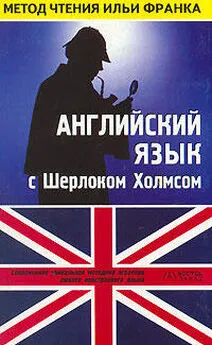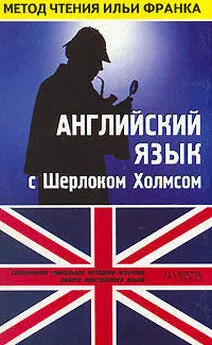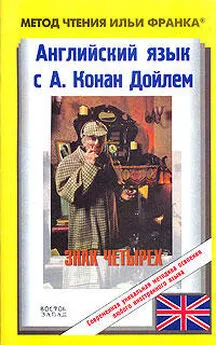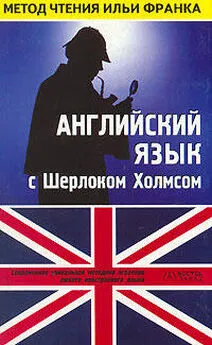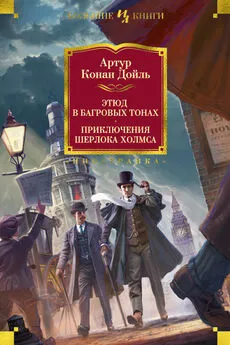Arthur Conan Doyle - Английский язык с Конан Дойлем. Этюд в багровых тонах (ASCII-IPA)
- Название:Английский язык с Конан Дойлем. Этюд в багровых тонах (ASCII-IPA)
- Автор:
- Жанр:
- Издательство:неизвестно
- Год:неизвестен
- ISBN:нет данных
- Рейтинг:
- Избранное:Добавить в избранное
-
Отзывы:
-
Ваша оценка:
Arthur Conan Doyle - Английский язык с Конан Дойлем. Этюд в багровых тонах (ASCII-IPA) краткое содержание
Первое произведение из цикла повестей о мастере дедуктивного метода, гениальном сыщике Шерлоке Холмсе, вышедшее в свет в 1887 году.
Текст адаптирован (без упрощения текста оригинала) по методу Ильи Франка: текст разбит на небольшие отрывки, каждый и который повторяется дважды: сначала идет английский текст с «подсказками» — с вкрапленным в него дословным русским переводом и лексико-грамматическим комментарием (то есть адаптированный), а затем — тот же текст, но уже неадаптированный, без подсказок.
Начинающие осваивать английский язык могут при этом читать сначала отрывок текста с подсказками, а затем тот же отрывок — без подсказок. Вы как бы учитесь плавать: сначала плывете с доской, потом без доски. Совершенствующие свой английский могут поступать наоборот: читать текст без подсказок, по мере необходимости подглядывая в подсказки.
Запоминание слов и выражений происходит при этом за счет их повторяемости, без зубрежки.
Кроме того, читатель привыкает к логике английского языка, начинает его «чувствовать».
Этот метод избавляет вас от стресса первого этапа освоения языка — от механического поиска каждого слова в словаре и от бесплодного гадания, что же все-таки значит фраза, все слова из которой вы уже нашли.
Пособие способствует эффективному освоению языка, может служить дополнением к учебникам по грамматике или к основным занятиям. Предназначено для студентов, для изучающих английский язык самостоятельно, а также для всех интересующихся английской культурой.
Мультиязыковой проект Ильи Франка: www.franklang.ru
От редактора fb2. Есть два способа оформления транскрипции: UTF-LATIN и ASCII-IPA. Для корректного отображения UTF-LATIN необходимы полноценные юникодные шрифты, например, DejaVu или Arial Unicode MS. Если по каким либо причинам вас это не устраивает, то воспользуйтесь ASCII-IPA версией той же самой книги (отличается только кодированием транскрипции). Но это сопряженно с небольшими трудностями восприятия на начальном этапе. Более подробно об ASCII-IPA читайте в Интернете:
http://alt-usage-english.org/ipa/ascii_ipa_combined.shtml
http://en.wikipedia.org/wiki/Kirshenbaum
Английский язык с Конан Дойлем. Этюд в багровых тонах (ASCII-IPA) - читать онлайн бесплатно полную версию (весь текст целиком)
Интервал:
Закладка:
exertion [Ig'z@:S(@)n], departure [dI'pA:tS@], endeavour [In'dev@], surmise [s@'maIz], malignant [m@'lIgn@nt]
Our morning's exertions had been too much for my weak health, and I was tired out in the afternoon. After Holmes' departure for the concert, I lay down upon the sofa and endeavoured to get a couple of hours' sleep. It was a useless attempt. My mind had been too much excited by all that had occurred, and the strangest fancies and surmises crowded into it. Every time that I closed my eyes I saw before me the distorted baboon-like countenance of the murdered man. So sinister was the impression which that face had produced upon me that I found it difficult to feel anything but gratitude for him who had removed its owner from the world. If ever human features bespoke vice of the most malignant type, they were certainly those of Enoch J. Drebber, of Cleveland. Still I recognized that justice must be done, and that the depravity of the victim was no condonement in the eyes of the law.
The more I thought of it the more extraordinary did my companion's hypothesis, that the man had been poisoned, appear (чем больше я думал об этом, тем более странным казалось предположение моего компаньона, что этот человек был отравлен; extraordinary — необычный, странный; удивительный) . I remembered how he had sniffed his lips (я помнил, как он понюхал его губы) , and had no doubt that he had detected something which had given rise to the idea (и не сомневался, что он обнаружил что-то, что привело его к этой мысли; to give rise — порождать, вызывать; давать повод: «давать подъем») . Then, again, if not poison, what had caused the man's death (к тому же, если не яд, что могло являться причиной смерти этого человека; to cause — послужить причиной) , since there was neither wound nor marks of strangulation (так как не было ни ран, ни следов удушения) ? But, on the other hand, whose blood was that which lay so thickly upon the floor (но, с другой стороны, чьей кровью был так густо забрызган пол: «чья кровь была это, что так густо лежала на полу») ? There were no signs of a struggle (не было следов борьбы) , nor had the victim any weapon with which he might have wounded an antagonist (и у жертвы не было никакого оружия, с помощью которого он мог бы нанести раны своему противнику) . As long as all these questions were unsolved (пока все эти вопросы оставались без ответа; unsolved — нерешенный, неразгаданный; to solve — разрешать проблему; объяснять) , I felt that sleep would be no easy matter, either for Holmes or myself (я чувствовал, что уснуть будет нелегко: «что сон будет нелегким делом», как Холмсу, так и мне) . His quiet self-confident manner convinced me that he had already formed a theory (по его спокойной, уверенной в себе манере я заключал: «его … манера убеждала меня», что он уже сформировал какую-то теорию; to convince — убеждать) which explained all the facts (которая объясняла все факты) , though what it was I could not for an instant conjecture (хотя в чем она заключалась, я и предположить не мог: «я и на мгновение предположить не мог») .
He was very late in returning (он вернулся очень поздно) — so late, that I knew that the concert could not have detained him all the time (настолько поздно, что я знал, что концерт не мог задержать его на все это время) . Dinner was on the table before he appeared (обед был уже на столе, когда он появился) .
hypothesis [haI'pOT@sIs], weapon ['wep@n], conjecture [k@n'dZektS@]
The more I thought of it the more extraordinary did my companion's hypothesis, that the man had been poisoned, appear. I remembered how he had sniffed his lips, and had no doubt that he had detected something which had given rise to the idea. Then, again, if not poison, what had caused the man's death, since there was neither wound nor marks of strangulation? But, on the other hand, whose blood was that which lay so thickly upon the floor? There were no signs of a struggle, nor had the victim any weapon with which he might have wounded an antagonist. As long as all these questions were unsolved, I felt that sleep would be no easy matter, either for Holmes or myself. His quiet self-confident manner convinced me that he had already formed a theory which explained all the facts, though what it was I could not for an instant conjecture.
He was very late in returning — so late, that I knew that the concert could not have detained him all the time. Dinner was on the table before he appeared.
"It was magnificent," he said, as he took his seat (это было великолепно, — сказал он, усаживаясь за стол; to take one’s seat — занять свое место, сесть на свое место) . "Do you remember what Darwin says about music (вы помните, что Дарвин сказал о музыке) ? He claims that the power of producing and appreciating it (он утверждает, что способность ее творить: «производить» и ценить ее) existed among the human race long before the power of speech was arrived at (появилась у человека: «существовала среди человеческой расы» задолго до появления речи: «прежде чем способность к речи была достигнута») . Perhaps that is why we are so subtly influenced by it (возможно, поэтому она так глубоко действует на нас; subtle — неуловимый, тонкий; едва различимый; subtly — тонко; to influence — оказывать влияние, воздействовать) . There are vague memories in our souls of those misty centuries (в наших душах смутные воспоминания о тех далеких веках; misty — туманный; неясный; смутный; mist — дымка, туман) when the world was in its childhood (когда мир был еще в колыбели; childhood — детство) ."
"That's rather a broad idea," I remarked (довольно смелая идея, — заметил я; broad — широкий; обширный; свободный; незашоренный) .
"One's ideas must be as broad as Nature if they are to interpret Nature (если вы собираетесь объяснить Природу, ваши идеи должны быть такими же смелыми, как Природа; to interpret — объяснять, толковать, интерпретировать) ," he answered. "What's the matter (в чем дело) ? You're not looking quite yourself (вы на себя не похожи: «вы не выглядите вполне самим собой») . This Brixton Road affair has upset you (этот случай на Брикстон-роуд расстроил вас) ."
"To tell the truth, it has (по правде говоря, да) ," I said. "I ought to be more case-hardened after my Afghan experiences (имея за плечами мой опыт Афганистана, я бы должен быть более невосприимчив к таким делам; case-hardened — загрубелый; нечувствительный) . I saw my own comrades hacked to pieces at Maiwand without losing my nerve (я не теряя самообладания видел, как моих товарищей рубили на куски при Мейванде; to lose one's nerve — струсить, потерять мужество, самообладание: «утратить свой нерв») ."
appreciate [@'pri:SIeIt], subtly ['sVtlI], vague [veIg], broad [brO:d]
"It was magnificent," he said, as he took his seat. "Do you remember what Darwin says about music? He claims that the power of producing and appreciating it existed among the human race long before the power of speech was arrived at. Perhaps that is why we are so subtly influenced by it. There are vague memories in our souls of those misty centuries when the world was in its childhood."
"That's rather a broad idea," I remarked.
"One's ideas must be as broad as Nature if they are to interpret Nature," he answered. "What's the matter? You're not looking quite yourself. This Brixton Road affair has upset you."
"To tell the truth, it has," I said. "I ought to be more case-hardened after my Afghan experiences. I saw my own comrades hacked to pieces at Maiwand without losing my nerve."
"I can understand (вполне понимаю: «я могу понять») . There is a mystery about this which stimulates the imagination (здесь скрывается тайна: «в этом есть тайна», которая будоражит: «стимулирует» воображение) ; where there is no imagination there is no horror (где нет места воображению, там нет места ужасу) . Have you seen the evening paper (вы видели вечернюю газету) ?"
"No."
"It gives a fairly good account of the affair (там довольно хорошо описано это дело; to give an account — давать отчет) . It does not mention the fact that when the man was raised up (там не упоминается, что когда тело подняли) , a woman's wedding ring fell upon the floor (на пол упало женское обручальное кольцо; to fall — падать) . It is just as well it does not (очень хорошо, что там этого нет: «это не упоминается») ."
"Why (почему) ?"
"Look at this advertisement (посмотрите на это объявление) ," he answered. "I had one sent to every paper this morning immediately after the affair (я разослал его этим утром во все газеты сразу же после нашего визита: «этого дела») ."
stimulate ['stImj@leIt], account [@'kaunt], affair [@'fe@]
"I can understand. There is a mystery about this which stimulates the imagination; where there is no imagination there is no horror. Have you seen the evening paper?"
"No."
"It gives a fairly good account of the affair. It does not mention the fact that when the man was raised up, a woman's wedding ring fell upon the floor. It is just as well it does not."
Читать дальшеИнтервал:
Закладка:

